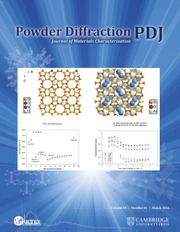Crossref Citations
This article has been cited by the following publications. This list is generated based on data provided by Crossref.
Wang, Qing
Suo, Zi Li
Zhang, Yong Kui
Hou, Quan
and
Li, Hui
2017.
X-ray powder diffraction data for 1-(4-methoxyphenyl)-7-oxo-6-[4-(2-oxopiperidin-1-yl)phenyl]-4,5,6,7-tetrahydro-1H-pyrazolo[3,4-c]pyridine-3-carboxylic acid ethyl ester, C27H28N4O5.
Powder Diffraction,
Vol. 32,
Issue. 3,
p.
206.


